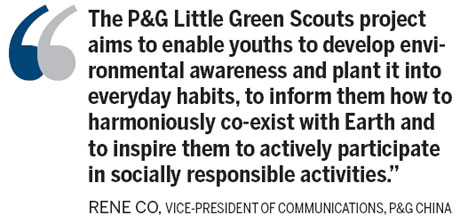

|
Greenhouse Effect is the title of a show performed by some Beijing primary school students during the launch ceremony of Little Green Scouts program, a drive aimed at helping Chinese youths to study, observe and experience nature and the environment. Provided to China Daily |
Procter and Gamble supports environmentally friendly Beijing youth project
Procter and Gamble personal care and consumer goods company announced its support for the Little Green Scouts program in Beijing, a drive aimed at helping Chinese youths to study, observe and experience nature and the environment.
At the launch ceremony, students from the primary school under Peking University performed a drama called Greenhouse Effect. It depicts an in-depth dialogue involving a thawing iceberg, a lumberjack, an air-conditioner, a car and a big boss.
From the dialogue, the iceberg found out the lumberjack damaged the environment through indiscriminate tree-cutting; the air-conditioner, which emits hydrochlorofluorocarbon (HCFC), had caused tremendous damage to the ozone layer; the car emitted greenhouse gases which not only posed threats to human health but also contributed to global warming; and the big boss was responsible for it all. So the iceberg realized they only had themselves to blame for the consequences.
The drama reminded people that if action is not taken, they will lose the blue sky. Ultimately, it is they who suffer from their own destructive actions. They can achieve environmentally friendly living by using their minds and hands.
"The P&G Little Green Scouts project aims to enable youths to develop environmental awareness and plant it into everyday habits, to inform them how to harmoniously co-exist with Earth and to inspire them to actively participate in socially responsible activities," said Rene Co, vice-president of Communications with P&G China.
The Little Green Scouts (China Youth Environmental Supervision Program) was initiated in 2011 partly by the Chinese Society For Environmental Sciences. It was included in the outline of the action plan for the nation's science literacy issued by the State Council in 2012. The project is classified as an environmental science dissemination project, supported by the Ministry of Environmental Protection and the Ministry of Science and Technology.
Scouts are encouraged to record their observations and thoughts through the use of the Internet such as by micro-blogging, to drive more people to learn and think about the environment and therefore promote change. The project directly targets youths but also hopes to bring in their parents to jointly inspire society to protect the environment.
"The little green scouts are very young, but they have great ambition," said Wang Yuqing, deputy director of the Committee of Population, Resource and the Environment, a member of the National Committee of the Chinese People's Political Consultative Conference and chairman of the Chinese Society For Environmental Sciences. "This project provides a great opportunity for little green scouts to experience the environment, to record and report environmentally friendly behavior and provide a platform for scouts to communicate and interact with their parents, teachers and the public. So environmental awareness will be planted into their young minds and will be embraced by more people as the communication and interactions spread out."
More than 2,000 students have already posted thousands of environmentally concerned posts. Sixty schools from Beijng, Shanghai, Guangdong, Hubei, Jiangsu and Yunnan have participated in the program. Over the next three years little green scouts from 100 primary and middle schools will take walks among nature, communities, farms and supermarkets to observe, experience and learn about their environmental status and action to improve it.
In addition to the scouts project, since 1996, one of the world's largest consumer goods company has joined hands with China Youth Development Foundation to support Project Hope, which enables poverty-stricken Chinese children to have better access to education.
By March 2011, P&G had cumulatively donated 61 million yuan ($9.8 million) to Project Hope, including 12.26 million yuan in a donation from P&G Global Public Welfare Fund. By the end of 2010, the company had built 200 P&G Hope Schools in 28 Chinese provinces.
In the same period, the Head & Shoulders shampoo maker facilitated 140 Happy Sports Yards, 120 Happy Music Classrooms, 100 Hope Libraries, 20 Health Sinks and 10 Happy Digital Theatres for the schools, donated 20 Hope Computer Classrooms together with business partners and arranged training for teachers from P&G Hope Schools in China.
P&G Hope Schools have benefited more than 150,000 children and 4,000 teachers across China over the past 15 years and more than 6,000 P&G China employees have actively supported its program activities. The company said on its website that this year is the 15th anniversary of the program and it will continue its long-term commitment.
liwoke@chinadaily.com.cn
